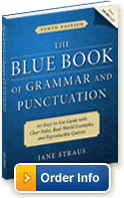|
Welcome to your GrammarBook.com E-Newsletter.

|
"Your lessons are great and so easy to follow."
- Georges N.
"I use the GrammarBook.com website whenever I need assistance with difficult grammar/syntax questions."
- Robin A.
"I love this grammar site."
- Ray R.
"My bosses think I am the guru of grammar, so itís nice to have your website for those occasions when I am not quite sure what to tell them."
- Natalie S.
|
|
|
Pronoun Tips
Several readers have written in regarding how often they both hear spoken and see in print the wrong usage of the pronouns I and me. Some readers wonder whether this is because some people think that the use of I rather than me sounds more formal or more distinctive, more upper class perhaps. I agree this is a very common error. Therefore, this week we will rerun our Grammar Tip on Pronouns, last run over a year ago. Next week, we will follow with the specific tip "I vs. Me" that we have not run since 2008.
Pronouns take the place of nouns.
Subject Pronouns: I, you, he, she, it, we, they
Object Pronouns: me, you, him, her, it, us, them
Rule: Use a Subject Pronoun (also called Nominative Case), not only as the subject of a sentence, but after to be verbs when the pronoun renames the subject.
To be verbs: is, are, was, were, will be, may be, may have been
Example: He is my friend.
He is the subject of the sentence, so use a subject pronoun.
Example: Enrique and she are friends.
Enrique and she are the subjects of the sentence.
Example: It is I who called.
I comes after the to be verb is and renames the subject it. Therefore, use the subject pronoun.
Rule: Use an Object Pronoun (also called Objective Case) when the pronoun is the direct object, the indirect object, or the object of the preposition.
Example: Ella met him at the restaurant.
Him is the direct object.
Example: Ella will give him his money back.
Him is an indirect object because you can mentally put the word to in front of it. Money is the direct object.
Example: Between you and me, this will never work. You and me are the objects of the preposition between.
Rule: Use reflexive pronouns—myself, himself, herself, itself, themselves, ourselves, yourself, yourselves—to refer back to another noun or pronoun in the sentence.
Correct Example: I did it myself.
Incorrect Example: Please give it to Butri or myself.
In this sentence, myself does not refer back to another noun or pronoun.
Due to the E-Newsletter's large readership, we are unable to respond to individual English usage questions. |
|
Free BONUS Quiz For You!
[[firstname]], because you are a subscriber to the newsletter, you get access to one of the Subscription Members-Only Quizzes. Click here to take a Pronouns Quiz and get your scores and explanations instantly!

"So convenient...hundreds of quizzes in one click."
[[firstname]], Subscribe to receive hundreds of English usage quizzes not found anywhere else!
- Take the quizzes online or download and copy them.
- Get scored instantly.
- Find explanations for every quiz answer.
- Reproduce the quizzes to your heart's content.
- EASY to use.
- No software to download.
- No setup time.
- A real person to help you if you have any questions!
"Fun to test my skills!" "The explanations really help...thanks!"
Your choice: Subscribe at the $29.95 or $99.95 level ($30 off - regularly $129.95).
"I download the quizzes for my students who don't have computer access."
Subscribe today to receive hundreds of English usage quizzes not found anywhere else!
"Makes learning English FUN!"
 |
Don't need all the quizzes at once?
You can now purchase the same quizzes individually for ONLY 99¢ each. Purchase yours here. |

Get Yours Today!
Get Amazon’s #1 Bestseller in Four Categories!
#1 in Grammar
#1 in Reading
#1 in Lesson Planning
#1 in Vocabulary |
The Blue Book of Grammar
and Punctuation by Jane Straus
An indispensable tool for busy professionals, teachers, students, homeschool families, editors, writers, and proofreaders.
Now available in print AND as an e-Book! Over 2000 copies are purchased every month!
Order Your Copy Today!
- Hundreds of Grammar, Punctuation, Capitalization, and Usage Rules
- Real-World Examples
- Spelling / Vocabulary / Confusing Words
- Quizzes with Answers
|
View the entire contents online
Discounts available for schools, bookstores, and multiple copies. Order Today!
 Wordplay Wordplay
Thank you to Sandra and Lyndall for submitting these riddles. Scroll down to view answers.
1. Which is correct to say, "The yolk of the egg are white" or "The yolk of the egg is white"?
2. If a farmer has five haystacks in one field and four haystacks in the other field, how many haystacks would he have if he combined them all in another field?
Learn all about who and whom, affect and effect, subjects and verbs, adjectives and adverbs, commas, semicolons, quotation marks, and much more by just sitting back and enjoying these easy-to-follow lessons. Tell your colleagues (and boss), children, teachers, and friends. Click here to watch.
Wordplay Answers
1. Neither is correct. The yolk of the egg is yellow.
2. One. If he combines all of his haystacks, they become one big stack.
|





 Wordplay
Wordplay
